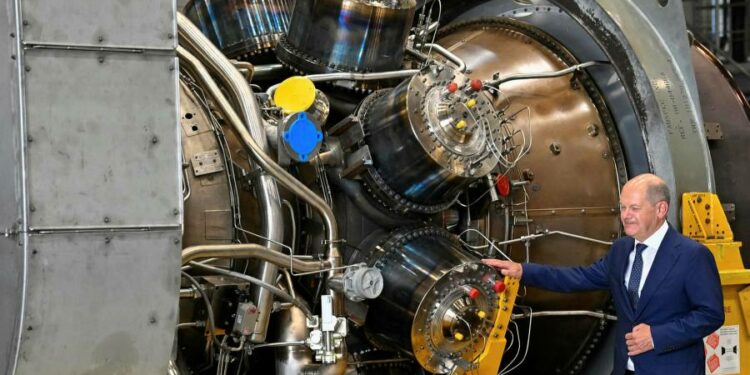German chancellor Olaf Scholz said it might “make sense” to extend the life of Germany’s last nuclear power plants, as reduced gas flows from Russia raise the prospect of a winter energy crunch in Europe’s largest economy.
He said the three plants due to close at the end of this year only accounted for a “small proportion” of Germany’s total electricity capacity. “But still it might make sense” to let them run for longer, he added.
Scholz said authorities would “draw our conclusions” from a stress test of the German electricity system that is currently being conducted and then decide what to do.
The chancellor also laid the blame for delays in the deployment of a crucial turbine for the Nord Stream 1 gas pipeline on Russia, accusing it of failing to take delivery of the equipment.
“It’s obvious that nothing — absolutely nothing — stands in the way of this turbine being transported to Russia and installed there,” he said.
Gazprom, the Russian gas group, had cited the absence of the turbine as it reduced the flow of gas through Nord Stream 1 in mid-June by 60 per cent. It went further last week, cutting flows to 20 per cent of its capacity.
The move stoked fears that Europe would fail to fill its gas storage ahead of the crucial winter heating season and be faced with a gas shortage that could disrupt daily life and tip Europe into a recession.
Scholz made the remarks while standing next to the turbine at the centre of the row — an unusual intervention designed to show the German public there was nothing stopping Gazprom taking delivery of the kit.
But Gazprom continues to insist that the problems with Nord Stream 1 are Europe’s fault, citing problems with turbine maintenance. “We urge the partners to resolve the issues as soon as possible and the situation with gas supplies to the European market will immediately normalise,” deputy chief executive Vitaly Markelov told state TV Rossiya-24.
The turbine had been undergoing maintenance in Canada, but the Canadian government initially refused to send it back to Russia, citing the sanctions regime it imposed on the Kremlin over Ukraine. Ottawa later relented after Scholz asked it to exempt the kit from the sanctions.
“What’s important is to make clear that this turbine can be deployed and used at any time,” Scholz said during his visit to the Siemens Energy plant at Mülheim an der Ruhr. “There’s nothing mystical going on here . . . The turbine is there, it can be delivered, someone just has to say they’d like to have it.”
Christian Bruch, chief executive of Siemens Energy, which made the turbine, said Gazprom had no justification for blaming the throttling of gas flows through Nord Stream 1 on the absence of the turbine.
He said that when it was sent to Canada, the Russians had an identical spare that could have been installed in its place. He said there were six such turbines in Portovaya, Nord Stream 1’s compressor station, and only five were needed for the pipeline to reach 100 per cent capacity. Yet only one was working. “That’s why we’re on just 20 per cent now,” he said.
Markelov insisted the gas compressor operating at Portovaya was the only one “in working condition”. Turbines at other units required maintenance or repairs, he said.
The question of whether Germany should continue to operate its nuclear power stations has become a huge bone of contention between the three parties in the country’s ruling coalition.
The smallest of the three, the liberal Free Democrats, want the plants to run for longer while Scholz’s Social Democrats and the Greens are opposed.
But Scholz indicated that a rethink was under way in the government. He hinted that some German states, such as Bavaria, might need to let their nuclear stations operate for longer because they had lagged behind in building wind farms and new electricity networks. “And we have to take that into consideration,” he said.
He also said Germany was exporting electricity to France, which has had to take several of its nuclear power plants offline for technical reasons, describing that as “an important contribution to European solidarity”.











